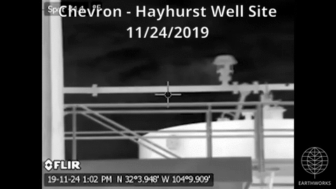
Earthworks, Greenpeace, and Global Witness have filed a complaint with the Federal Trade Commission (FTC) asking them to hold Chevron, the world’s second largest polluter, accountable for advertising itself as environmentally friendly. The complaint asks the FTC to further investigate the oil major’s false and misleading claims about their business practices. In particular, Chevron purports a commitment to investing in renewable and low carbon energy that misleads consumers away from where Chevron’s actual investment priorities lay: in producing a staggering amount of carbon emissions.
This practice, commonly known as greenwashing, is a tactic used by major oil and gas companies to distract consumers from the climate crisis for which they are largely responsible. Greenwashing is Chevron’s desperation for a social licence to operate; meanwhile, Chevron regularly pollutes methane—a greenhouse gas 86 times more potent over the short term than carbon dioxide—and plans to expand oil and gas drilling in areas like the Permian Basin.
Rather than addressing its methane pollution, Chevron is attempting to completely reshape its public presence to keep pace with the public’s perception of the climate crisis. The oil major now uses social media like Twitter and other avenues of communication with average consumers to convince people that they care about the environment and are doing everything they can to alleviate the climate crisis—without, of course, actually doing anything or even acknowledging that it is their fault in the first place.
Chevron has described itself as a provider of “affordable, reliable, ever-cleaner energy to improve people’s lives and enable human progress” while simultaneously investing a mere 0.2% of its capital expenditures in low-carbon energy sources from 2010-2018 and increasing its overall carbon emissions from crude oil, methane, and oil-equivalent production from 2017 to 2019. They, like all other oil majors, take advantage of the everyday person’s ignorance of what carbon or methane “intensity” are—terms the industry created to obfuscate their lack of investment or interest in effectively addressing their emissions. This is garden-variety greenwashing—common, but devastating to the entire planet, because it allows fossil fuel companies to continue with business as usual even as the climate crisis makes wildfires, typhoons, hurricanes, and other natural phenomena worse, killing hundreds of thousands of people and displacing millions more.
In addition, this complaint addresses Chevron’s ludicrous attempt to paint itself as an ally to the Black Lives Matter movement. In early June, as the George Floyd Uprising had swept throughout the United States, Chevron tweeted a graphic saying “racism has no place in America . . . we stand in support of the black community and all those seeking systemic change” with a link to a statement from their corporate executives. While, again, this is fairly basic corporate opportunism, these statements are especially heinous considering that Chevron, just like all oil and gas companies, has and continues to disproportionately harm Black people and other people of color: these marginalized groups face disproportionately higher rates of air pollution, which can lead to increased rates of health impacts including lung disease, asthma, heart disease, and premature death, and higher COVID-19 death rates.
Chevron, which calls itself “the human energy company,” has a long history of causing environmental disasters in the backyards of socially disadvantaged communities both in the United States and in other countries: the company still has yet to clean up the 16 billion gallons of toxic waste it dumped into the Ecuadorian Amazon rainforest from 1964 to 1990, poisoning the lands and waters of Indigenous and rural Ecuadorians, or to clean up pollution left behind in the Niger Delta, Nigeria. Chevron’s refineries in the U.S. are responsible for generations of environmental harm; as recently as February 2021 Chevron spilled oil in Richmond, California—where nearby residents have long suffered from health impacts due to air and water pollution.
Our complaint, in sum, asks the FTC to investigate and take action to enjoin Chevron from making false and misleading claims about the company’s business practices. For too long corporations like Chevron and other oil majors have taken advantage of loose or vague rules regarding advertising and other interactions with consumers, and our coalition seeks to hold them to account in order to ensure that they cannot lie to the public without consequence again.

